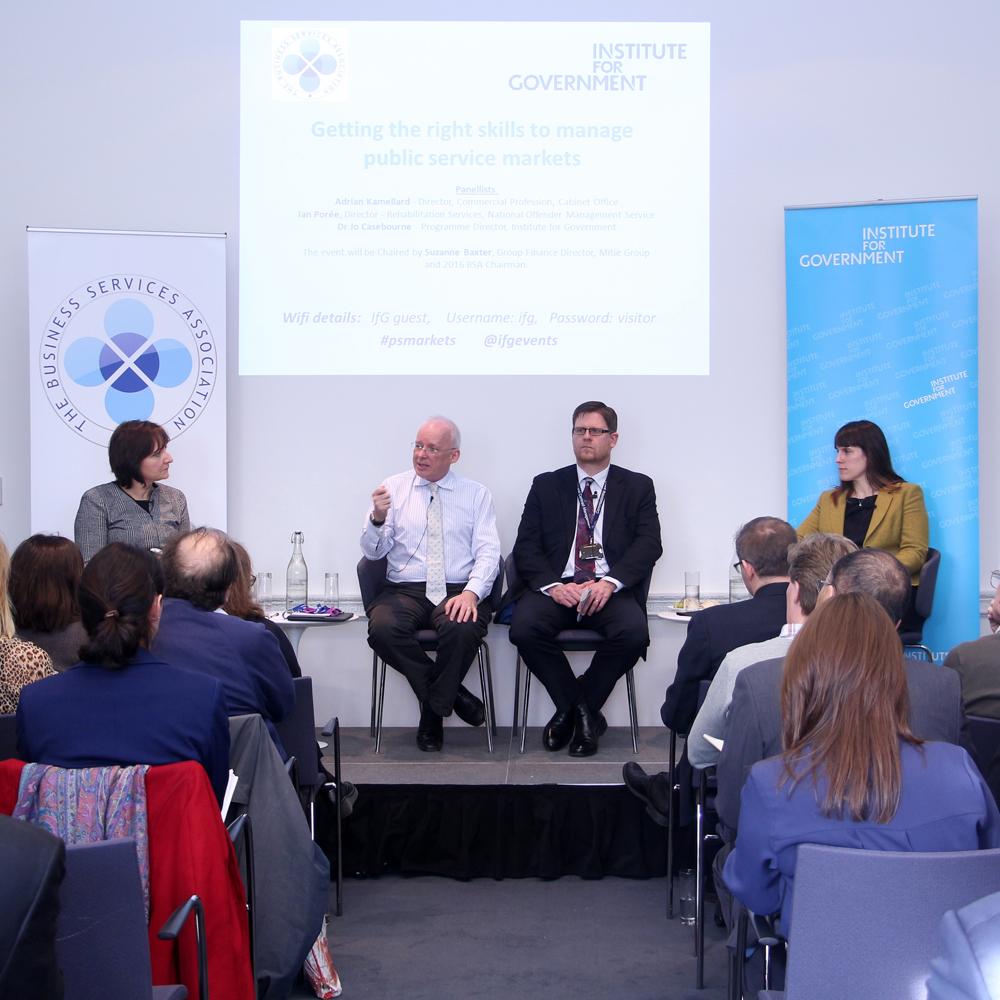The UK’s public service markets have produced real successes such as online vehicle tax renewal and domestic waste collection, but there have been plenty of high-profile problems along the way. Following the third event in the series Where Next for Public Service Markets?, Sophie Wilson looks at the different ways the public sector manages these markets.
What is the Government doing to address the skills gap?
Around £62 billion is spent a year across the UK central government on public sector contracts (not including the NHS). Yet as Adrian Kamellard, Director of the Commercial Profession in the Cabinet Office recognises, the Government does not currently have the necessary commercial capability or capacity to manage such a high volume of public sector deals.
Speaking as part of a panel of experts convened by the Institute for Government and Business Services Association for the latest event in a series entitled Where Next for Public Service Markets, Kamellard explained how the Commercial Capability Programme, a cross-government effort led by the Cabinet Office, was created to help combat this lack of commercial talent. It has developed a set of standards for senior civil servants to increase capabilities in expertise, leadership skills and business acumen. Kamellard is hopeful about the future of the Civil Service’s commercial skills.
Also on the panel, Ian Porée, Director of Commissioning and Contract Management for the National Offender Management Service (NOMS), described an interesting approach to ensure the benefits of these skillsets are maximised. NOMS have opened up their services to a range of providers over the last few years; half of their business is now delivered through contracted service provision. As part of this shift from delivery to commissioning functions, NOMS have integrated commercial skills into their core business, including embedding commercial expertise into business management teams and providing them with multidisciplinary support. This deploys commercial skills within business decision making rather than having it as a separate, add-on function.
How do public services recruit and retain commercial talent?
Porée said that people are the public sector’s biggest asset. Few would disagree with him. This is especially the case where the public sector has taken time to train and develop staff expertise. Retention policies are therefore critical to retaining talent, as the public and private sectors compete for people with an in-depth understanding of public sector markets.
Although pay and rewards clearly contribute to attracting and retaining people, Kamellard described how greater flexibility in the system allows individuals to move between public and private roles and can also help to attract professionals with commercial experience into the civil service. Methods like secondments also provide an opportunity to develop new skills and transfer existing ones, while creating a more rounded employee.
Likewise, the creation of a Commercial Fast Stream within the Civil Service, where civil servants rotate across procurement and contract management roles, opens the door for building a broad base of experience throughout government. This includes building skills in system stewardship – learning to recognise and understand the wider parts of the system and knowing how to set the rules of the market.
What more needs to happen?
While the Government is making progress in addressing the skills gap, the Institute for Government believes more could be done. Institute for Government programme director Jo Casebourne told the audience about the IfG’s work developing an online interactive Guide to Public Service Markets, which offers advice to practitioners at all levels. She outlined ways the Government can improve its ability to manage markets, by:
- Ensuring that the best commercial talent within and outside government is deployed on government’s highest value and highest risk projects – and retained.
- Building commercial awareness within the broader policy making community and encouraging greater integration between policy and commercial teams – as policy makers often play a role in initiating and advising ministers on major reforms.
- Developing clear overall leadership and responsibility for the oversight of public service markets at the centre of government.
Although the panel agreed on the urgency of getting the right skills in place across the Civil Service, they were hopeful about the prospects of continuing to develop the commercial talent required to set up and manage public service markets successfully.
The final event in the series will be held on Tuesday 1 March and will look at how to effectively engage the public in decisions about public sector markets.
The event was chaired by Suzanne Baxter, Group Finance Director, Mitie Group and 2016 BSA Chairman.
- Topic
- Public services
